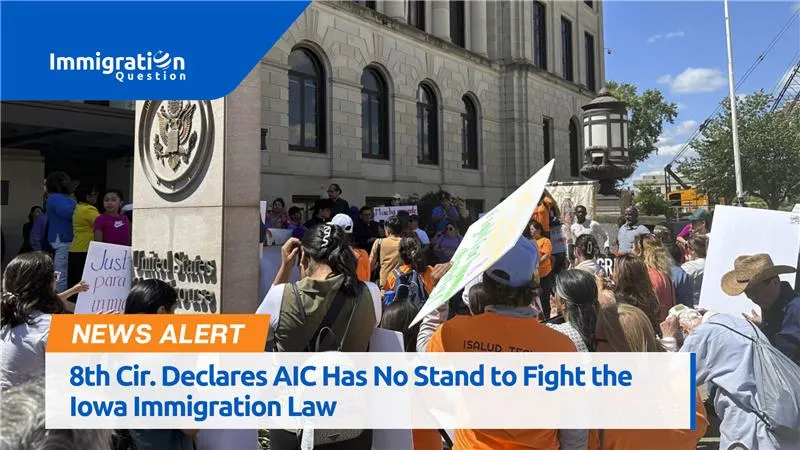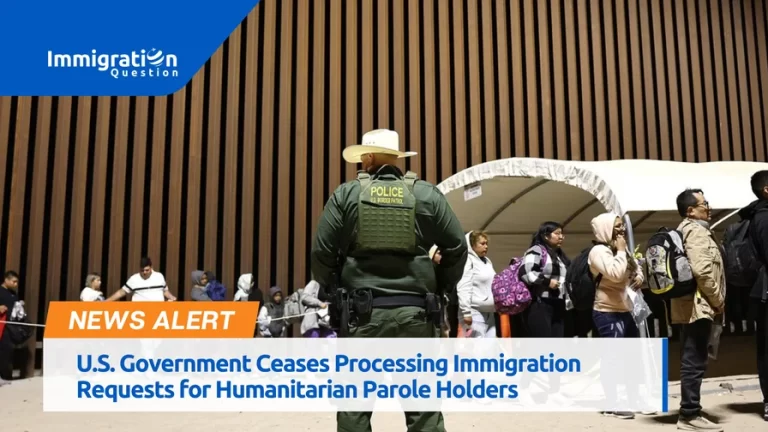A group of judges on Thursday, 27th September 2024, questioned whether the American Immigration Council could be part of a lawsuit over a new Iowa law that makes it a crime for people who have been deported to be back in the country. They were sceptical of the council’s claim that they would face serious problems because of the law.
The judges on the panel for the Eighth Circuit were Duane Benton, Morris S. Arnold, and Jonathan A. Kobes.
The aim of the Iowa immigration law
Reynolds and other Republicans support the law to tackle increasing illegal border crossings under President Biden. Reynolds believes the federal government hasn’t done enough to enforce immigration laws, leading states to step in.
Border crossings hit record highs under Biden but have since dropped after Biden restricted asylum and after Republicans blocked a bipartisan border agreement. This led to a 32% decrease in illegal crossings in July, the fifth month in a row.
Iowa’s new law allows police to arrest and charge noncitizens who have been deported or barred from entering the US with a crime, making it a serious offense. In some cases, it could even become a felony, up to 10 years in prison. The law also allows judges to order the person to leave the country or face jail time.
An earlier ruling on the law
In a June ruling, US District Judge Stephen H. Locher concluded that Iowa’s law, S.F. 2340, might be blocked by the Supreme Court’s 2012 decision in Arizona v. U.S., which ruled against parts of Arizona’s “show me your papers” immigration law, Senate Bill 1070.
Iowa’s position
During the hearing, Eric H. Wessan from the Iowa Attorney General’s Office strongly supported Iowa’s argument that the court had gone too far in interpreting a previous court decision. Wessan pushed for the judges to reject the DOJ’s claim that the law was completely out of bounds, saying that Congress had left no space for state involvement because it had covered the whole area of immigration law.
Wessan mentioned that the Arizona case only found one bit of S.B. 1070 requiring noncitizens to register with the state to be blocked and turned down the government’s request to block the whole law. In this case, Wessan noted that the Supreme Court said the part of S.B. 1070 that let police arrest people they thought might be deported was blocked by conflict, not by the law itself.
More importantly, he said all the Supreme Court justices in Arizona agreed it is okay for a state law to begin even if there is a chance for conflict, as long as the conflict can’t be avoided.
At a press conference after the hearing, Winger mentioned that entering and removing people is a key part of immigration where the federal government’s interest is much stronger than the part of the law about registering noncitizens, which was blocked in Arizona.
“Since this law deals with a field that is all federal, there is no way to avoid an unconstitutional use,” Winger said.
The panel tackles the AIC
During a short hearing about Iowa’s request to overturn a temporary ban on the law, the judges didn’t have many questions. They were especially critical of Emma C. Winger, the council’s Deputy Legal Director, who said the council’s clients could be arrested, charged, sent back to their home countries, and separated from their families. Winger was representing the Iowa Migrant Movement for Justice and some of its members who said they could be unfairly targeted by the law.
When asked to explain how the law would work in real life, Winger mentioned Anna, a high school student and a member of the Iowa Migrant Movement for Justice who could be arrested and charged under the law.
Winger said Anna was deported when she was a kid because her mom ran away from danger to the US, but she was later given asylum. Winger argued that Anna could still be charged under the law until her asylum case was decided. “Isn’t her situation not resolved by then?” Judge Duane Benton asked, suggesting that people like Anna might not have a case. “Because she is now legal.”
Iowa has said that if someone gets legal status after entering the US illegally, they wouldn’t be prosecuted by the law. Winger disagreed with this, saying that the plaintiffs had been deported before. “And they are all in Iowa, so they could all be prosecuted under this law,” she said.
The position of the US government
The US Department of Justice also took issue with the law in its own lawsuit, arguing that it conflicts with federal immigration law. Both sides in the lawsuit, which included the Migrant Movement for Justice, said the law was too broad and should be struck down.
The government’s lawyer was Leif Overvold from the US Department of Justice, Civil Division.
To stay updated and informed, keep an eye out for our news section or drop your immigration queries for professional attorneys to reply on immigration question.










